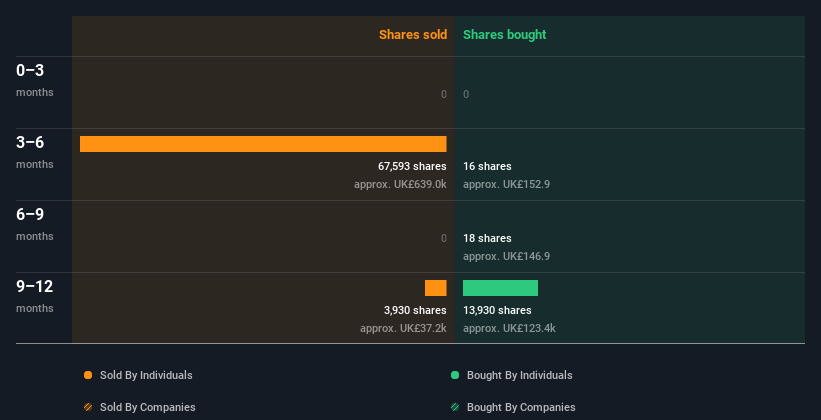- United Kingdom
- /
- Real Estate
- /
- LSE:SVS
Insiders At Savills Sold UK£676k In Stock, Alluding To Potential Weakness

Many Savills plc (LON:SVS) insiders ditched their stock over the past year, which may be of interest to the company's shareholders. When evaluating insider transactions, knowing whether insiders are buying versus if they selling is usually more beneficial, as the latter can be open to many interpretations. However, when multiple insiders sell stock over a specific duration, shareholders should take notice as that could possibly be a red flag.
Although we don't think shareholders should simply follow insider transactions, logic dictates you should pay some attention to whether insiders are buying or selling shares.
See our latest analysis for Savills
Savills Insider Transactions Over The Last Year
In the last twelve months, the biggest single sale by an insider was when the CEO of Savills Investment Management & Member of Group Executive Board, Alexander Jeffrey, sold UK£402k worth of shares at a price of UK£9.45 per share. That means that an insider was selling shares at around the current price of UK£9.07. While we don't usually like to see insider selling, it's more concerning if the sales take place at a lower price. In this case, the big sale took place at around the current price, so it's not too bad (but it's still not a positive).
Over the last year, we can see that insiders have bought 13.96k shares worth UK£119k. On the other hand they divested 71.52k shares, for UK£676k. In total, Savills insiders sold more than they bought over the last year. You can see a visual depiction of insider transactions (by companies and individuals) over the last 12 months, below. If you click on the chart, you can see all the individual transactions, including the share price, individual, and the date!

If you like to buy stocks that insiders are buying, rather than selling, then you might just love this free list of companies. (Hint: insiders have been buying them).
Does Savills Boast High Insider Ownership?
Another way to test the alignment between the leaders of a company and other shareholders is to look at how many shares they own. I reckon it's a good sign if insiders own a significant number of shares in the company. Savills insiders own about UK£10m worth of shares. That equates to 0.8% of the company. We've certainly seen higher levels of insider ownership elsewhere, but these holdings are enough to suggest alignment between insiders and the other shareholders.
So What Does This Data Suggest About Savills Insiders?
It doesn't really mean much that no insider has traded Savills shares in the last quarter. We don't take much encouragement from the transactions by Savills insiders. But it's good to see that insiders own shares in the company. While we like knowing what's going on with the insider's ownership and transactions, we make sure to also consider what risks are facing a stock before making any investment decision. You'd be interested to know, that we found 2 warning signs for Savills and we suggest you have a look.
Of course, you might find a fantastic investment by looking elsewhere. So take a peek at this free list of interesting companies.
For the purposes of this article, insiders are those individuals who report their transactions to the relevant regulatory body. We currently account for open market transactions and private dispositions, but not derivative transactions.
New: Manage All Your Stock Portfolios in One Place
We've created the ultimate portfolio companion for stock investors, and it's free.
• Connect an unlimited number of Portfolios and see your total in one currency
• Be alerted to new Warning Signs or Risks via email or mobile
• Track the Fair Value of your stocks
Have feedback on this article? Concerned about the content? Get in touch with us directly. Alternatively, email editorial-team (at) simplywallst.com.
This article by Simply Wall St is general in nature. We provide commentary based on historical data and analyst forecasts only using an unbiased methodology and our articles are not intended to be financial advice. It does not constitute a recommendation to buy or sell any stock, and does not take account of your objectives, or your financial situation. We aim to bring you long-term focused analysis driven by fundamental data. Note that our analysis may not factor in the latest price-sensitive company announcements or qualitative material. Simply Wall St has no position in any stocks mentioned.
About LSE:SVS
Savills
Engages in the provision of real estate services in the United Kingdom, Continental Europe, the Asia Pacific, Africa, North America, and the Middle East.
Excellent balance sheet, good value and pays a dividend.
Similar Companies
Market Insights
Community Narratives



